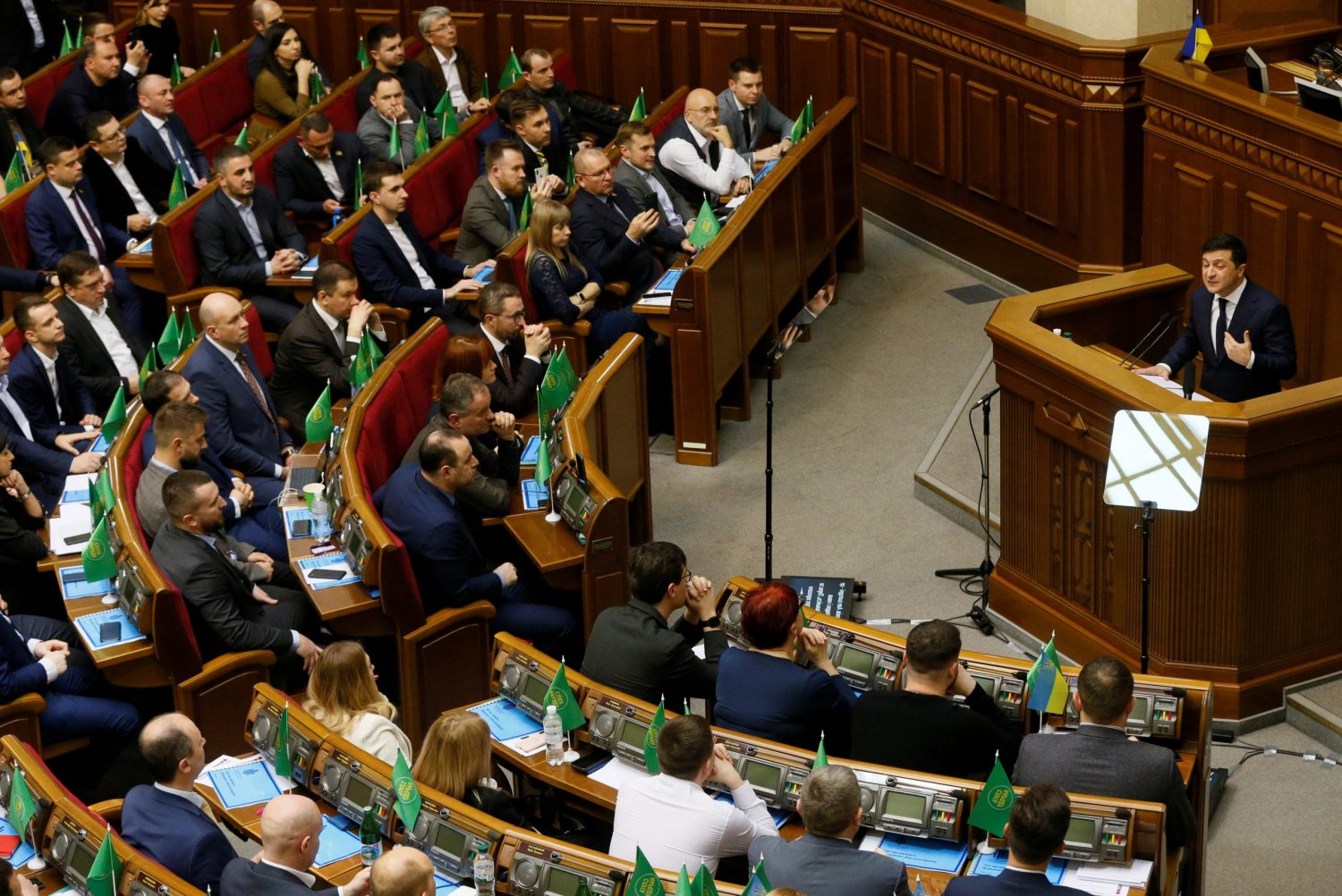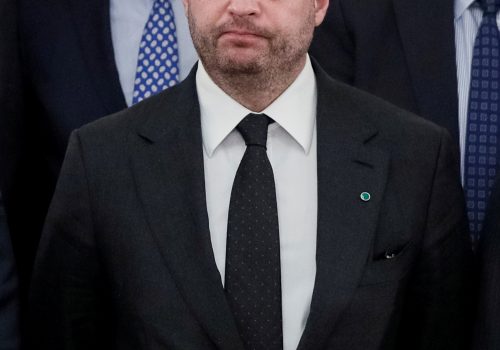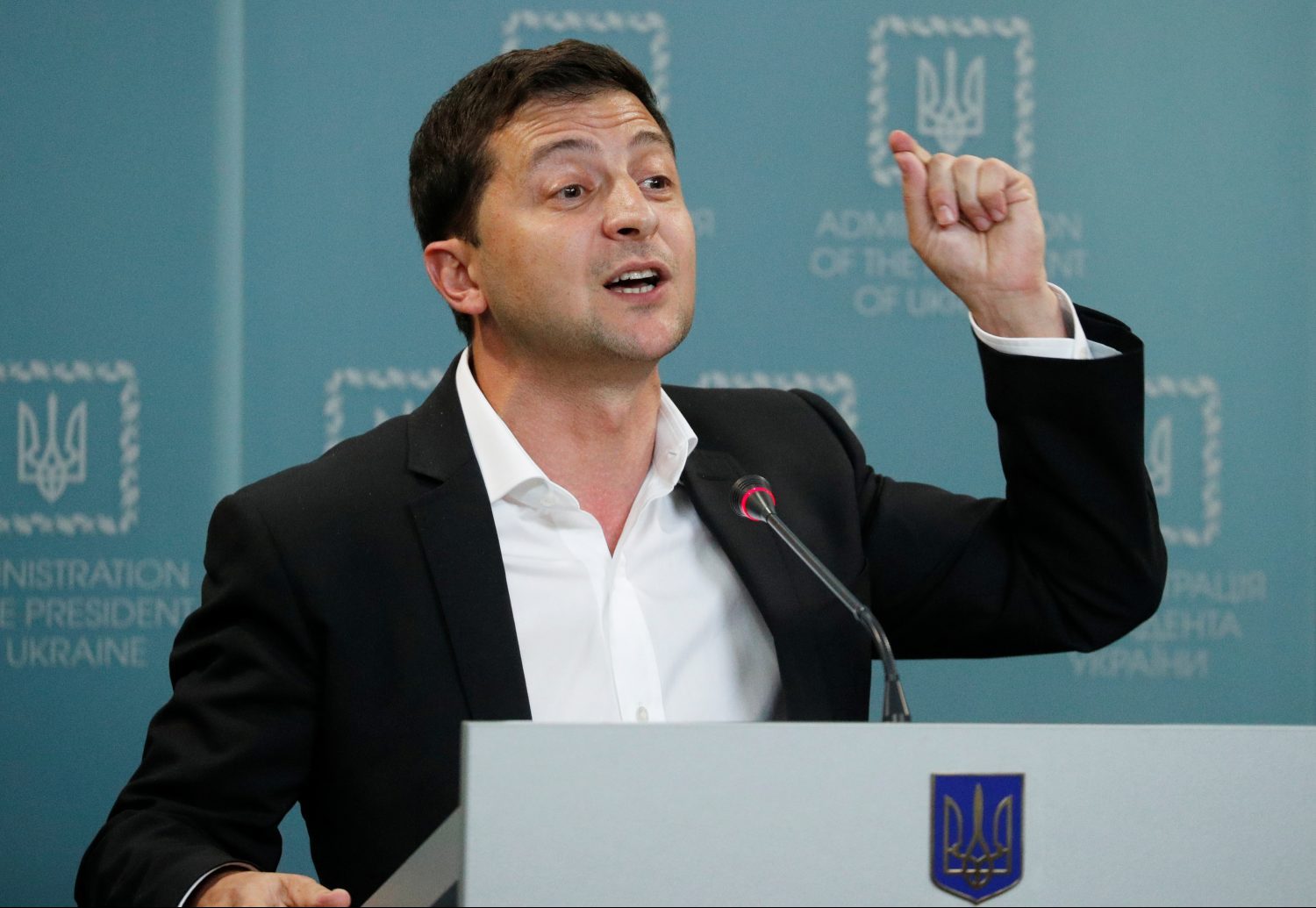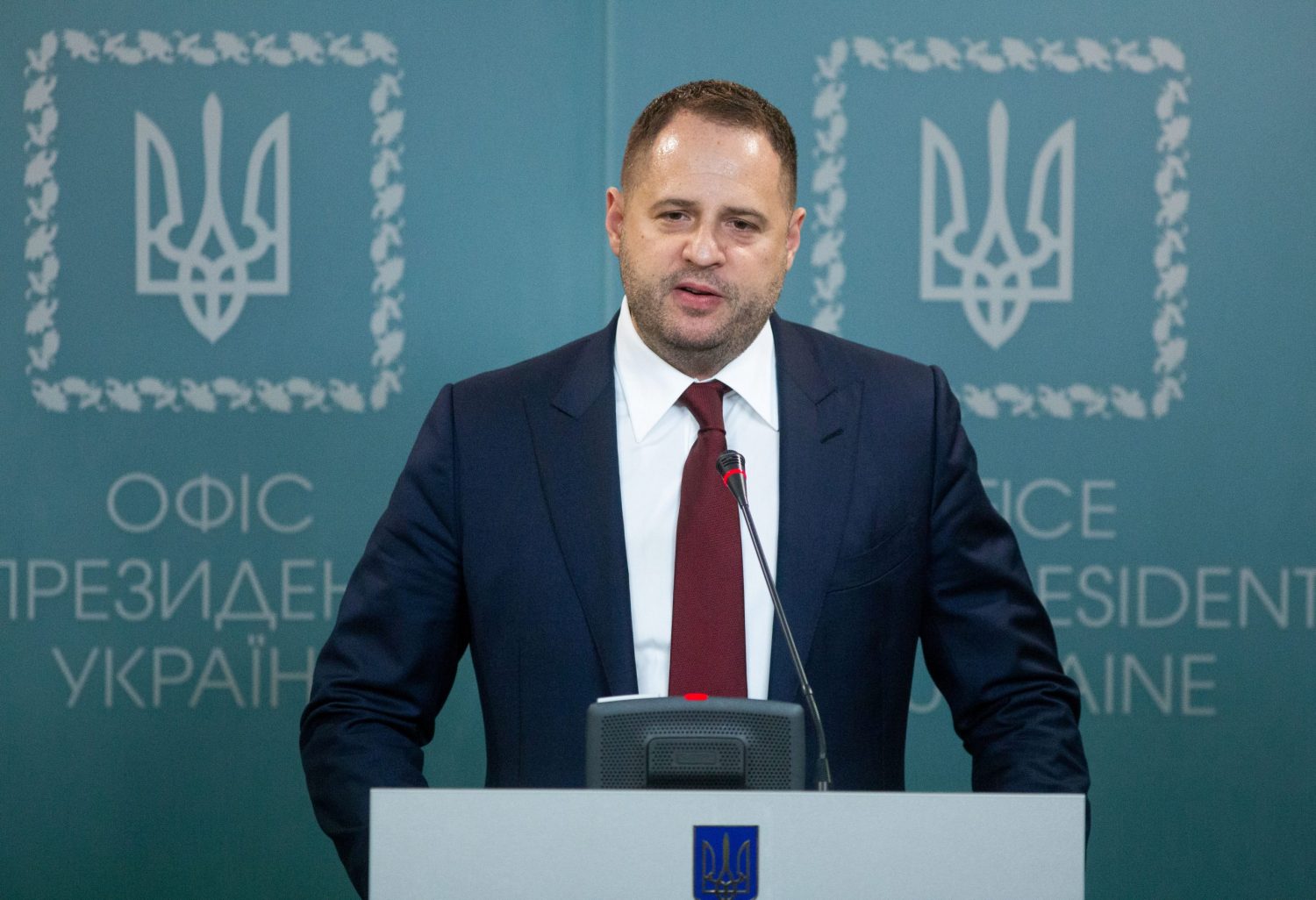Ukrainian President Volodymyr Zelenskyy has this week dismissed the first government of his administration just half a year after it first took office. In changes confirmed by parliament on March 4, Prime Minister Oleksiy Honcharuk left his post and was replaced by the relatively unknown Denys Shmyhal. Many senior members of the government also departed in the reshuffle, with new finance, foreign and defense ministers appointed.
The sweeping changes come after President Zelenskyy’s initial choices struggled to make sufficient headway over the past six months despite enjoying a one-party parliamentary majority for the first time in modern Ukrainian history. Zelenskyy stormed to presidential and parliamentary election success in 2019 on a platform of change that promised an end to the undeclared war with Russia and a break with the oligarch-dominated politics of the past. However, as he approaches the first anniversary of his spring 2019 election triumph, Zelenskyy has been unable to secure peace with Russia and remains dogged by accusations of close ties to oligarch Igor Kolomoiskiy. His approval ratings have sagged accordingly, dropping from highs of over seventy percent to below fifty percent.
Explaining the logical behind his reshuffle, Zelenskyy said outgoing ministers had been honest but ineffective and promised a new government of professionals. “This was the first government where there was no high-level corruption. But not stealing is not enough. This was a government of new faces, but faces are not enough. New brains and new hearts are needed.” In line with this emphasis on professionalism and in a departure from earlier efforts to distance himself from the past, Zelenskyy’s picks for his second government include a number of ministers with experience in previous Ukrainian administrations. What does this shake-up say about Zelenskyy’s own political evolution, and how will it shape the country’s future direction?
John Herbst, Director, Eurasia Center, Atlantic Council: The wholesale changes in Ukraine’s government this week have sparked substantial hand wringing from reformers in Kyiv and from Ukraine’s well-wishers in Washington and other Western capitals. This is understandable. Over thirty years of independence, Ukraine has had regular experience of promises broken and slow reform. The question is whether the latest changes return Ukraine to this dreary path.
The first thing to note is that the initial nine months of the Zelenskyy administration have featured serious reform, similar in some ways to the major reform that characterized the first year of the Poroshenko administration. The second point is that the changes over these nine months were driven by reformers in the ministries and agencies, supported by the prime minister and, behind him, the president. Of course, the prime minister is gone, and so are some excellent reform ministers and agency heads. While there is no clear evidence that, as a group, the new personnel are interested in slowing or reversing reform, it is also not certain they will drive reform. The third point is that the circumstances of the Zelenskyy administration have not changed. The President ran as a reformer. He claims that he has made changes because the reform process has not moved fast enough. If he does not proceed with reform, his still strong but shrinking approval ratings will drop like a stone and his relations with Western governments and financial institutions will become complex.
All of this suggests that the prudent course is to reserve judgment and watch what happens. There are certain bellwethers. Will the new team backtrack on PrivatBank and decide that an IMF deal is not necessary? Will they show an unusual interest in investigating the previous president? Will they stop or slow down the implementation of commitments made to reform the defense sector, or stop moving legislation on land and banking reform in parliament? Will the other reformers remain in place? The answers to these questions will help us understand what this week’s government reshuffle means.
Melinda Haring, Deputy Director, Eurasia Center, Atlantic Council: It’s hard to say anything positive about Zelenskyy’s new cabinet. The more I study it, the less I sleep. I’m deeply worried about the direction in which Zelenskyy is taking Ukraine. Ihor Umanskyy, the new Finance Minister, fiercely opposes working with the International Monetary Fund, which has actively kept Ukraine’s reform agenda on track even when its leaders have tried to veer off. The new minister of veterans affairs has a tense relationship with the remarkable charities that help veterans in the Donbas. Plus, there’s only one woman in the entire cabinet, which is obnoxious and insulting. Ukraine has got hundreds if not thousands of top women primed for executive roles. We don’t know if Ukraine is back to the bad old days, but the picture is bleak. Every reformer and activist I know is depressed and determined to keep Ukraine on a pro-European path. All in all, Zelenskyy’s promises to fix Ukraine fast ring hallow.
Andy Hunder, President, American Chamber of Commerce in Ukraine: I was impressed with Denys Shmyhal as regional governor when I visited Ivano-Frankivsk six weeks ago. At the time, I wrote on my social media that he was one of the most business-friendly governors that I had met in Ukraine. He’s coolheaded, prudent, a no-nonsense kind of guy. The feedback that I got from companies in the region about him was positive throughout. He was subsequently appointed deputy PM at a time when rumors started circulating that the PM could be out. I remember then telling my team that he’s one to watch and could be lined up for the role as PM. It turned out that I guessed right. However, the government reshuffle couldn’t have come at a worse moment for Ukraine, with the coronavirus outbreak, a global market downturn, no IMF deal, secondary market bondholders becoming itchy, and significant sovereign debt repayments due. The key priorities of the new government should be to ensure macroeconomic stability, continue cooperation with the International Monetary Fund, and boost Foreign Direct Investment.
Stay updated
As the world watches the Russian invasion of Ukraine unfold, UkraineAlert delivers the best Atlantic Council expert insight and analysis on Ukraine twice a week directly to your inbox.
Brian Bonner, Chief Editor, Kyiv Post: It’s hard to find any good news here. Removing Oksana Markarova and keeping Arsen Avakov? A big step backwards. The inability to find someone right away for the economy and energy ministries is revealing. Reforms are off track in so many areas, including the banking and land reforms required for IMF lending. Economic forecasts are being revised downward. The Kyiv Post’s “Unkept Promises” series looks like it will be true for a long time to come: unpunished bank fraud, no law enforcement or judicial reform, big city mayors ruling with impunity and, finally, the enduring power of the oligarchs.
Solomiia Bobrovska, Ukrainian MP, Holos party: The Holos faction informed our fellow parliamentarians about the backgrounds of the new ministers. At least seven of the newly appointed members of the cabinet, including the prime minister, either have ties to Russia or to Ukrainian oligarchs, or both. Unfortunately, our address proved a voice in the wilderness, so we decided to leave the parliamentary session. Most of us were active participants in the Revolution of Dignity. We cannot vote for ministers who were either serving in the Yanukovусh administration, or who have businesses in Russia in partnership with colonels of the Russian army, or who destroyed Ukrainian military intelligence and failed to notice Russian preparations for invasion in 2013-2014. These are not the “new faces” Zelenskyy promised during the 2019 election campaign. The priority now is to prevent backsliding to pre-Maidan times. We will continue to fight against a system where everything is orchestrated from the office of the president, and where everything in the office of the president is orchestrated from the Kremlin.
Michael Bociurkiw, Global Affairs Analyst: By shuffling his cabinet after less than a year in office and sacking some talented individuals, Ukrainian President Volodymyr Zelenskyy runs the risk of proving his detractors correct in claiming that he is impulsive, has no strategy, and ranks loyalty over skill. Oleksiy Honcharuk now suffers the ignominy of holding the keys to the Prime Minister’s office for the shortest term ever in modern Ukrainian history. Some of Zelenskyy’s choices for the new government are so poor that he would probably have done less damage to himself by appointing co-stars from his Servant of the People comedy series. It is not all bad news, however. The new Foreign Minister Dmytro Kuleba moves comfortably in the corridors of power in Western capitals and is the perfect choice during these challenging times, especially when there is a dire need to repair Kyiv’s tattered relationship with the Trump White House. So let’s not write off Zelenskyy just yet. I have always said he could turn out to be smarter and more politically savvy than most of us think.
Eurasia Center events

James Brooke, Chief Editor, Ukraine Business News: In Brazil, they used to say, “the economy grows at night, because the politicians are asleep.” I hope Ukraine is not moving in that direction. Instead of showing a steady hand at the tiller, Zelenskyy fires two-thirds of the cabinet after only six months in office. This is not the work of a team-builder. Time will tell about the new “professionals” brought in to replace time-tested reformers, but it seems likely that an IMF deal will now be pushed toward the summer. Coronavirus fears are currently provoking a capital retreat from emerging markets. It is delusional to believe that Ukraine can successfully follow a Kolomoiskiy-inspired path to go it alone. As much as it needs access to low interest money, Ukraine also needs the “Good Housekeeping Seal of Approval” that comes with an IMF deal. To foreign investors, this is a shorthand way of demonstrating that Ukraine is following a time-proven orthodox path. Zelenskyy inherited Ukraine’s best macroeconomic situation since independence from the Poroshenko presidency, with inflation matching the growth rate, dropping debt to GDP ratios, and a stable currency. Now should be the time to implement the economic changes that will produce growth. Instead, we have dramatic and disruptive changes. Leaders don’t follow opinion polls. They create new facts on the ground that shape opinion.
Oleksiy Goncharenko, Ukrainian MP, European Solidarity party: Oleksiy Honcharuk has set a new record. He was the youngest prime minister in Ukrainian history, and now he is the PM with the shortest term in office of just six months. He departs along with most of his ministers. There are two key reasons for these changes. The first is the dramatic decline in President Zelenskyy’s approval ratings, and the second is Zelenskyy’s personal displeasure over Honcharuk’s leaked conversation questioning the President’s competency. This means that the era of new faces has come to an end. Zelenskyy and his team have created a number of problems including a big budget deficit and declining industrial production. They are now looking for political adults to provide solutions. However, the government of new PM Denys Shmyhal will not find solutions because the problem is Zelenskyy himself. He wants to rule in an authoritarian manner but he has no strategic plan for Ukraine. Moreover, due to a lack of confidence in Zelenskyy, a number of respected professionals refused to serve in his second government. As Ukraine addresses the challenges of Russian aggression and a weak economy along with a possible global recession, these changes in government only serve to heighten the risks facing the country.
Peter Dickinson is editor of the Atlantic Council’s UkraineAlert blog.
Further reading
The views expressed in UkraineAlert are solely those of the authors and do not necessarily reflect the views of the Atlantic Council, its staff, or its supporters.

The Eurasia Center’s mission is to enhance transatlantic cooperation in promoting stability, democratic values and prosperity in Eurasia, from Eastern Europe and Turkey in the West to the Caucasus, Russia and Central Asia in the East.
Follow us on social media
and support our work
Image: Ukrainian President Volodymyr Zelenskyy explains his government reshuffle to MPs in Kyiv on March 4, 2020. REUTERS/Valentyn Ogirenko




